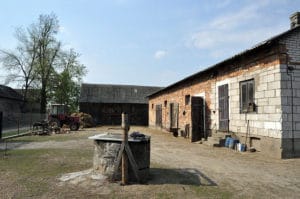Farmers in northern Poland are demanding the right to sell the food they produce in local shops, fighting oppressive sanitary regulations, picketing the Land Agency for access to prime farmland, and resisting GMOs.
The Ecologist
By Julian Rose & Jadwiga Lopata

Beata Zdyb, Wikimedia
A fight-back by farmers is gathering momentum in the provinces of North Poland to secure prime government-owned farmland; prevent any planting of GM crops; and repeal oppressive food regulations that prohibit local sales.
Since 2013, farmers have been drawing attention to their plight via well organised picketing of the government Land Agency responsible for land sales.
Two to three hundred farmers have been participating in a rotation of tractor blockades within the city of Schechin in Sahodnapomolska province where the Agency is situated.
Film of farmers’ protest: http://youtu.be/UlOC__K2LT0
Foreign investors
The Polish government has denied favouring foreign investors, but thousands of hectares of prime farmland have been put on the market over the past few years – undermining rentee polish farmers’ ability to expand their family farming enterprises and secure the long-term viability of their businesses.
The International Coalition to Protect the Polish Countryside is supporting this action, recognising that foreign corporations can exploit loopholes in the law and start planting GM crops on newly acquired land.
The protesting farmers have welcomed the support and the anti-GM stance has now been adopted as part of the farmers’ demand that has been presented to the Agricultural Minister and Prime Minister, Tusk.
A further, more recent inclusion of this demand is an ICPPC supported call to end highly repressive Polish-government initiated hygiene and sanitary laws.
Draconian sanitary regulations
These draconian regulations are making it virtually impossible for small and medium-sized family farmers to process their farm-house foods and sell them in local shops and markets.
At a recent farmers’ blockade the table was laid out with a wide range of ‘Illegal Foods’ that represented virtually all Poland’s most popular and renowned farm products.
These included smoked hams, sour cabbage, raw milk, bread, pickles and cheeses: all foods that do not comply with regulations requiring farmers to carry out any processing operations in specially constructed premises that are not affordable to any but the largest farms supplying the supermarket trade.
Deliberately supporting large-scale monoculture
The Polish media caught the significance of this ‘Illegal Food Table’ and carried the story bringing pressure to bear on government authorities responsible for enforcing these regulations.
Demands for an explanation are at this time being raised in the Polish Parliament by sympathetic Parliamentarians and answers are being demanded for why Poland has been saddled with the harshest and most irrational food regulations in the whole of the European Union.
The regulations – many think deliberately – favour large, monocultural farming operations while ignoring the needs of the 1.5 million family farms. The family farmers form the backbone of Poland’s traditional agricultural community, as well as producing the majority of these high quality authentic foods.
As this goes to press, word is coming through of more supportive farmers’ actions taking place in other regions of the country, with an accompanying groundswell of public support.

